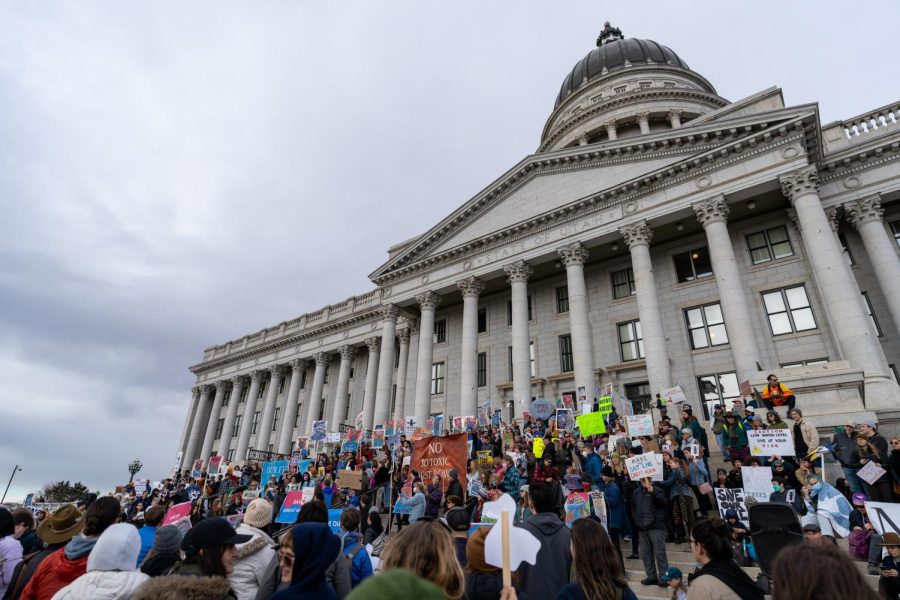Lien: Student Activists, Slow Down
Participants at Rally To Save Our Great Salt Lake at the Utah State Capitol in Salt Lake City on Saturday, Jan. 14, 2023. (Photo by Xiangyao “Axe” Tang | The Daily Utah Chronicle)
January 31, 2023
Politics exhaust even the strongest-willed individual. New chaos happens all the time, and you must keep on top of every little detail if you want to stay informed. It’s only natural to lose sight of what matters sometimes. In our current political climate, burnout and activism fatigue go hand in hand.
We need to fight political fatigue and activism burnout to sustain an educated population and keep the rights we too often take for granted.
Due to burnout, activists often temporarily or entirely quit activism. It’s more serious than just quitting their passions. Activists have described their burnout as a deterioration of psychological, emotional and physical health along with feelings of hopelessness. Symptoms of burnout include anxiety, depression, anger, ambivalence, difficulty sleeping and winding down, sleeping too much or being on edge — all real and detrimental issues.
Activist culture takes pride in martyrdom, and activists take on responsibility for the issues they represent. It’s overwhelming to have the weight of the world on your shoulders. Politics constantly move and shift, so many don’t have any time to breathe or take care of themselves.
Activism fatigue affects everyone, but particularly minorities and especially Black racial justice activists. Burnout and fatigue hurt those whose lives are dependent on an outcome. Allyship for the causes that don’t directly affect you still has its place in politics, but it’s a privilege to not have to be as concerned about the outcome.
Fighting a centuries-old war is difficult enough. Add on the constant impact that racism has on one’s daily life, along with everything happening in the world, and it isn’t hard to see why activists get disillusioned. This contributes to burnout, too. Losing battles and constantly getting up to bat is part of what makes an activist, but also what causes burnout.
Once again, burnout causes physical and psychological detriments. The body begins shutting down. Aside from that, burnout negatively affects the movement itself. If too many activists go up in flames, where does that leave the organization?
Activist work drains those who engage in it and students tend to bear more of the weight than others think. We’re here, first and foremost, to learn. We shouldn’t have to expend our time, energy and sanity to benefit a community that ignores us.
For college students, activism can feel like a large amount of labor for little payoff. Minority students and participants in a study done by The Review of Higher Education found that their activism faced backlash from school administrators, and that the students themselves were disconnecting from the important relationships in their lives. Notably, The Review found that minority faculty and staff who supported minority student activists provided additional labor and had more responsibilities.
Many students don’t get “the privilege of just being a student.” This results in having less time to engage in other activities they enjoy and benefit them.
I can’t — and won’t — get up on my soapbox and ask you to keep going and work through it. Truthfully, I haven’t actively kept up with politics in years. Ignorance is bliss, I’ll tell you, but also terrifying. An uneducated population allows tyranny to easily rise to power.
Recognize that, if you’re experiencing this kind of burnout, it isn’t a reflection of you or that you lack empathy. Your body simply decided it’s time to take a break. Though some may think otherwise, it’s not selfish to allow yourself space. Working yourself to the bone hurts you, and without you, your organization is that much further from its goal.
Like any other type of burnout, stepping away from the stressor helps. Easier said than done, but taking care of yourself is the priority. Set healthy boundaries and remain honest with yourself about how you’re doing.
If the fight isn’t about you, then it isn’t about you. For activists whose lives are affected by an issue, support them and listen to them. Don’t make your Black friends explain the history of anti-Blackness to you, do your research.
Political burnout and activism fatigue are very real and detrimental reactions to today’s social environment. It hurts minority groups worse than others, so remember to back up your politically active friends of color. It’s healthy to take a step back. But when it’s time to fight, we need every voice possible. With Utah’s legislative session starting up, we must wrap our hands and bare our teeth and keep our fundamental human rights.








